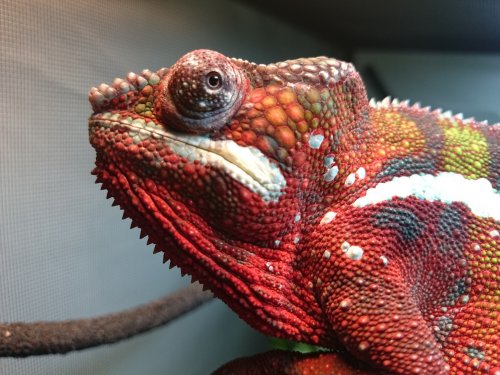kiwilulu
Member
Full disclosure: I am a new chameleon owner, just learning the ropes.
As my adventure with a pair of veiled begins, 4 weeks ago, I have been researching how to take the best care of them. They now have good lighting, temperature, misting system, and all the basics covered. The one thing that I have found particularly problematic is feeding and specifically supplements. I feed them crickets, worms and have started a dubia colony -my chams eat them like candy! I am feeding the dubias a mixture of dry fish food (incredibly high protein), poultry food, a hefty dose of calcium, as well as oranges and some veggies. The colony is doing very well, and I have not had a single adult die.
When I bought my first Calcium supplement (Fluckers Reptacalcium-the one that the Pet store guy recommended, ...sigh...) I realized that it had D3 100,000 IU per lb. Then I looked at ZooMed ReptiCalcium and it had 22,907 IU per kg. It quickly became obvious that there is no standard in these supplements.
When I look at most people in the forum, the standard answer for dusting is Calcium without D3 every feed, with D3 every 2 weeks and multivitamins every month. Why? I guess because the half life of Vit D3 is 2 weeks... but still, why give them a D3 spike with the consequent hypercalcemia (damage to heart, bones and kidneys), instead of using a steady low dose Vit D3 daily?
I am listing some supplements below with their D3 content so that you can see how it varies dramatically
RepCal 400,000 IU/kg
Fluckers Reptacalcium 100,000 IU/lb
Exoterra 14,740 IU/lb
ZooMed ReptiCalcium 22,907 IU/kg
As my adventure with a pair of veiled begins, 4 weeks ago, I have been researching how to take the best care of them. They now have good lighting, temperature, misting system, and all the basics covered. The one thing that I have found particularly problematic is feeding and specifically supplements. I feed them crickets, worms and have started a dubia colony -my chams eat them like candy! I am feeding the dubias a mixture of dry fish food (incredibly high protein), poultry food, a hefty dose of calcium, as well as oranges and some veggies. The colony is doing very well, and I have not had a single adult die.
When I bought my first Calcium supplement (Fluckers Reptacalcium-the one that the Pet store guy recommended, ...sigh...) I realized that it had D3 100,000 IU per lb. Then I looked at ZooMed ReptiCalcium and it had 22,907 IU per kg. It quickly became obvious that there is no standard in these supplements.
When I look at most people in the forum, the standard answer for dusting is Calcium without D3 every feed, with D3 every 2 weeks and multivitamins every month. Why? I guess because the half life of Vit D3 is 2 weeks... but still, why give them a D3 spike with the consequent hypercalcemia (damage to heart, bones and kidneys), instead of using a steady low dose Vit D3 daily?
I am listing some supplements below with their D3 content so that you can see how it varies dramatically
RepCal 400,000 IU/kg
Fluckers Reptacalcium 100,000 IU/lb
Exoterra 14,740 IU/lb
ZooMed ReptiCalcium 22,907 IU/kg


